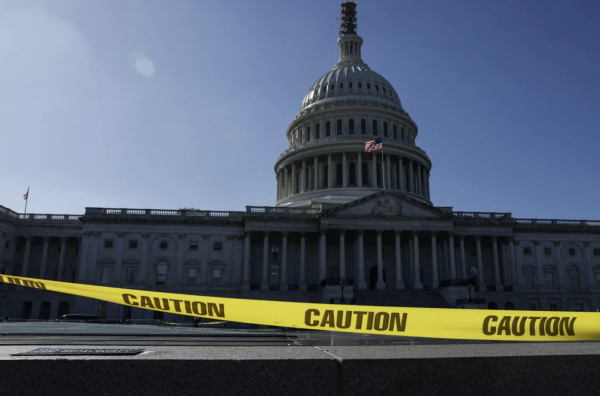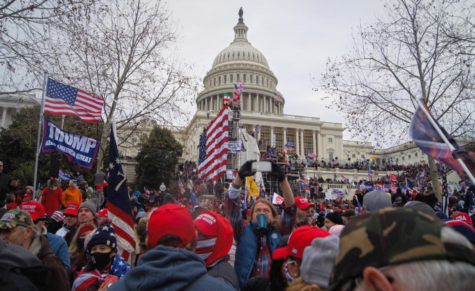Politics of NFL kneeling controversy
It started with a simple action. To protest police brutality toward African Americans, former San Francisco 49ers quarterback Colin Kaepernick began sitting during the playing of the National Anthem in August of last year. On Sept. 1, 2016, Kaepernick, joined by San Francisco safety Eric Reid, switched to taking a knee. Though Kaepernick opted out of his contract with the 49ers, slowly, more players, spectators, band members, and singers began to join him in kneeling. By Sept. 24 of the next year, over 200 players sat or kneeled in response to President Donald Trump’s call for the protesting players’ dismissals from the league. On Nov. 13, GQ chose Kaepernick as their 2017 Citizen of the Year. And before a game between the Dallas Cowboys and the Philadelphia Eagles on Nov. 19, hundreds of protesters gathered outside the AT&T stadium with raised fists. Kaepernick’s silent protest during the playing of the anthem has ignited a movement in the NFL and in America that has yet to be extinguished.
Despite the movement’s support, the nature of the protests raised questions regarding its implications. Conventional protocol towards the flag and anthem requires that everyone at a game stands and faces the flag. Official NFL protocol, however, does not explicitly require a certain type of behavior, only stating that players “should stand at attention, face the flag, hold helmets in their left hand, and refrain from talking,” and “failure to be on the field by the start of the National Anthem may result in discipline…” Though official procedure is not explicit, many believe that the act of kneeling during the National Anthem, especially during Veteran’s Day, shows irreverence to the values which these national symbols encompass.
“Namely around the time of Veteran’s Day, it kind of brings back the point that the flag represents our freedom and it represents the people that fight for our freedom. I don’t think that’s what they’re trying to get at, but I think that’s what a lot of people see it as.”
Contrary to common perception of the protests, however, Kaepernick’s decision to kneel aimed to do the very opposite. Before Kaepernick and Reid began the kneeling protests, they met with retired Green Beret and former NFL player Nate Boyer. Consequently, they determined that unlike sitting, Kaepernick’s original form of protest, kneeling was a respectful gesture. Nevertheless, Hunter brings up an important point: people can very easily misinterpret the original message of the protest.
“There isn’t a clarification as to why it’s being done,” said Kay Solomon, chair of the Department of Biblical and Religious Studies. In addition to Old and New Testament courses, Solomon teaches a social ethics elective for juniors and seniors. “People don’t understand why it’s being done. People think that people are protesting just to indiscriminately disregard and disrespect the flag. And to suggest that this protest has anything to do with a piece of fabric is simplistic and doesn’t get at the real reason.”
The real reason, says Solomon, involves how African Americans feel that they do not experience the very principles expressed by the flag and anthem in America. These protests come at a pivotal moment, in the midst of case upon case of violence involving members of the police and African American men and women.
“It’s not a matter of, ‘we’re protesting this flag,’” said Solomon. “It’s not a matter of, ‘we’re against this flag.’ It’s a matter of, we say we are the United States. We say freedom and justice for all, and yet we’re not experiencing that the way white people do. We say that we are a nation of equality, then why is it that a disproportionate number of black men are being treated unjustly?”
Furthermore, beyond venerating material symbols like the flag and the anthem, many like senior Kelsey Russell emphasize the importance of practicing the actual values behind the symbolism. In addressing the social issues presented in these protests, she believes, people can ultimately show respect for the fundamental values of freedom and equality that characterize America.
“If you believe that the American troops are fighting for our freedom of speech, then I assume you would be okay with however we choose to express that,” said Russell. “I think that respecting the United States is respecting other people’s rights.”
In fact, many African American students and faculty at Westminster have experienced racial discrimination from members of the police, such as senior Truman Jones, captain of the Westminster football team and homecoming king. Though these cases may not have the same bloody outcome as some interactions that dominate the news, many understand the possibility that a simple encounter, like pulling someone over, could go awry.
“I’ve had experiences for myself where I’ve been encountered by police unjustly, in this neighborhood,” said Jones. “I live around Buckhead, and they see me walking around, and they think, what am I doing here? My mom always warns me about dealing with police officers, and two hands on the wheel, and she’s like, if you are ever pulled over, just call me, because [my parents] are scared that that could be the end.”
Though some support addressing inequality and enacting change, students have differing opinions about the inclusion of politics on the field. Some, like senior David Edmiston, believe that politics and sports should stay separate.
“Talking about politics does not bring the team closer but instead sometimes can divide us,” said Edmiston. “I would be more than happy to talk about racial issues off the field, but when I put on my pads, I don’t want to talk politics but rather joke and focus on the greatest game in the world, football.”
Jones, on the contrary, has discussed the issue of kneeling within his affinity group and with other team captains. Should the opportunity arise, he decided along with a few other African American football players, they would kneel.
“As athletes on this campus, I feel like we have the responsibility to be a role model to students,” said Jones. “At football games, there are a lot of people there. By taking a knee, we would show that we stand for the Black Lives Matter movement and show that we’re not just going with whatever the campus goes with.”
Hunter expressed concern about the effectiveness of using such a controversial protest method especially within football.
“With the platform [NFL players] have, they can really make a difference,” said Hunter. “When it comes down to it, it’s just all about what kind of difference they’re trying to make. I don’t mind keeping politics in sports if it’s trying to push things forward and make a change, but oftentimes I feel like these players are trying to stir up controversy and it’s not making anything go anywhere except further to the left and further to the right.”
Nevertheless, politics and sports have shared a long history. At the 1968 Summer Olympics in Mexico City, U.S. gold medalist Tommie Smith and bronze medalist John Carlos raised black-gloved fists and bowed their head during the playing of the National Anthem. Controversy over politics in sports isn’t new either; the crowd began to boo them and they were ordered to leave the stadium. Because of the great publicity of sports, it can serve as a platform for political movements. According to Tim Downes, director of athletics at Westminster, most political protests that enact change, especially ones that involve core American values, inevitably attract controversy.
“I think if you look at the issues here, and I’ve seen it broken down into three separate frameworks, and I think one is patriotism, one is freedom of speech, and one is racial injustice,” said Downes. “People are very passionate around those issues. How you feel about each is really based off your own experience.”
Nonetheless, Hunter’s point draws attention to the presence of a deep divide between opinions in America. The lingering question that seems to characterize the current political climate arises: How do we overcome this divide?To start answering that question, AP English teacher Jesse Breite assigned his students a creative piece based on Mary Shelley’s Frankenstein. In the novel, Shelley utilizes a frame narrative technique, which involves two or more narrators. Similarly, Breite asked his students to write from two points of view, one of which had to conflict with an American institution. Many students chose to write about the NFL protests. The English department, says Breite, often discusses how to apply the study of literature to current events and real issues. This application, according to Breite, helps students determine their values and certain aspects of their identity.
“I think we have to engage with contemporary culture,” said Breite. “I think we have to engage with politics; we have to figure out what we think and experiment with our feelings when we’re in English class.”
While engaging in political issues in an assignment is feasible, many students find the real challenge in conversing with others who may have differing views or have no initial interest in political issues. Those who participate in discussions in clubs like BRIDGE, Young Democrats, Young Conservatives, or affinity groups decide to participate due to their interest in current events. Thus, many find it difficult to include a wide variety of viewpoints in the conversation when not everyone wants to participate.
“I do wish the conversation would extend further to other people who have different opinions than me and my close peers, just because I think maybe I don’t understand why [kneeling] is disrespectful,” said Russell. “Maybe that’s because I don’t have anybody who’s served in the military in my immediate family.”
Because people often exclude different viewpoints, Solomon believes that this unwillingness to engage with difference hinders mutual understanding. Therefore, says Solomon, understanding others’ identities should play a role in the forefront of any discussion that aims to bring two sides together. For her, this includes learning from the personal experiences of others, especially unique experiences that stem from our differences.
“When you yourself don’t experience the injustice, when you yourself don’t experience the discrimination that black men experience every day, and you don’t care to know, you don’t care to have a conversation with somebody to understand their story, then it’s not going to be productive,” said Solomon. “Color is part of who people are. Ethnicity, nationality, heritage is a part of who people are. To try to understand that is to advance one’s own self.”
Controversies like the NFL protests exemplify the issues that arise from a country like America, with a population that is ever-growing and increasing with different types of people.
“This is the oldest American question: What does it mean to live in democracy with people of different voices, of different backgrounds?”
And, according to Breite, it maybe worthwhile to consider these issues and reflect on what they mean for our country – what we, as Americans, value, who we are, how we connect with others, and ultimately, what we can learn.







